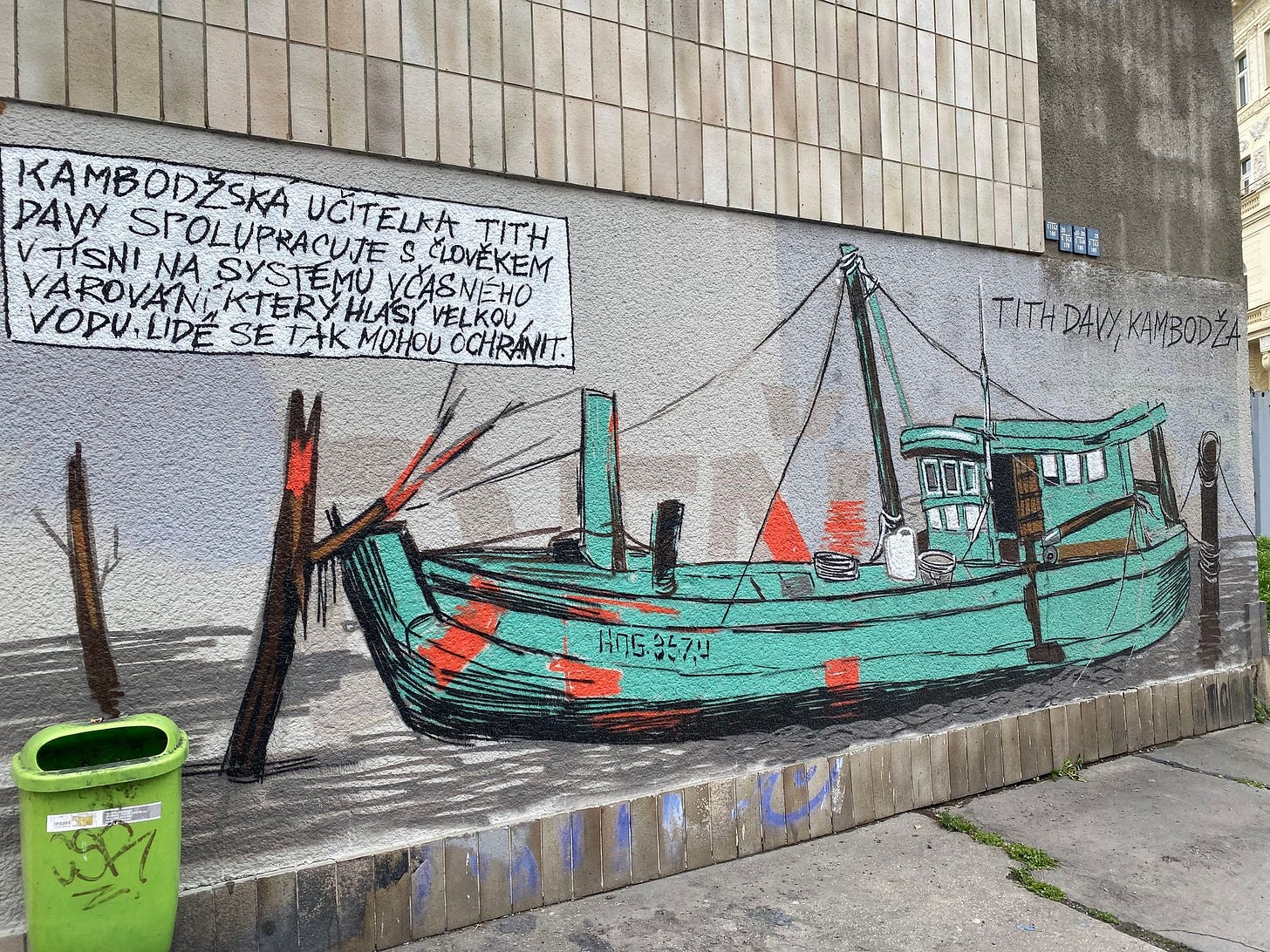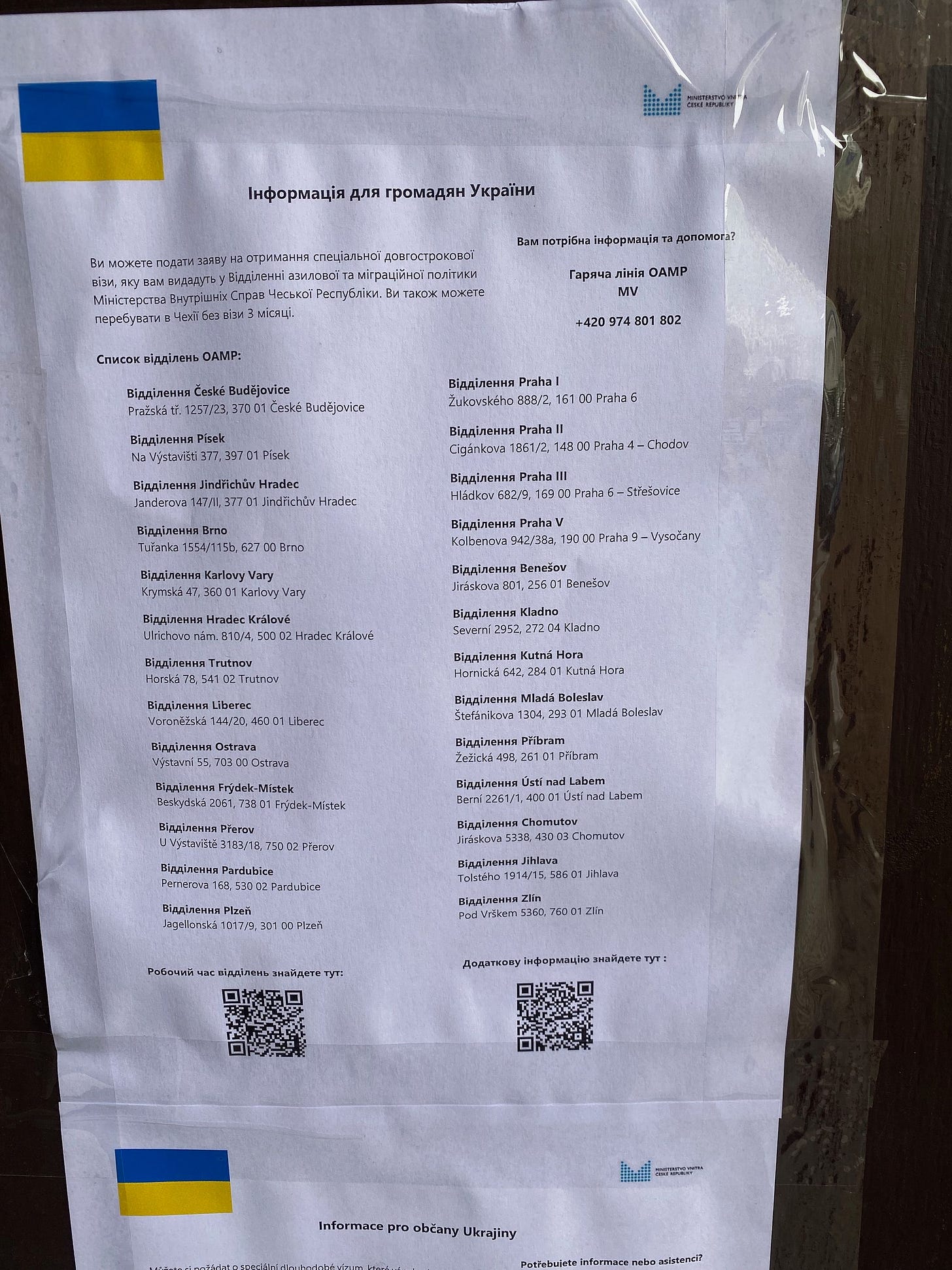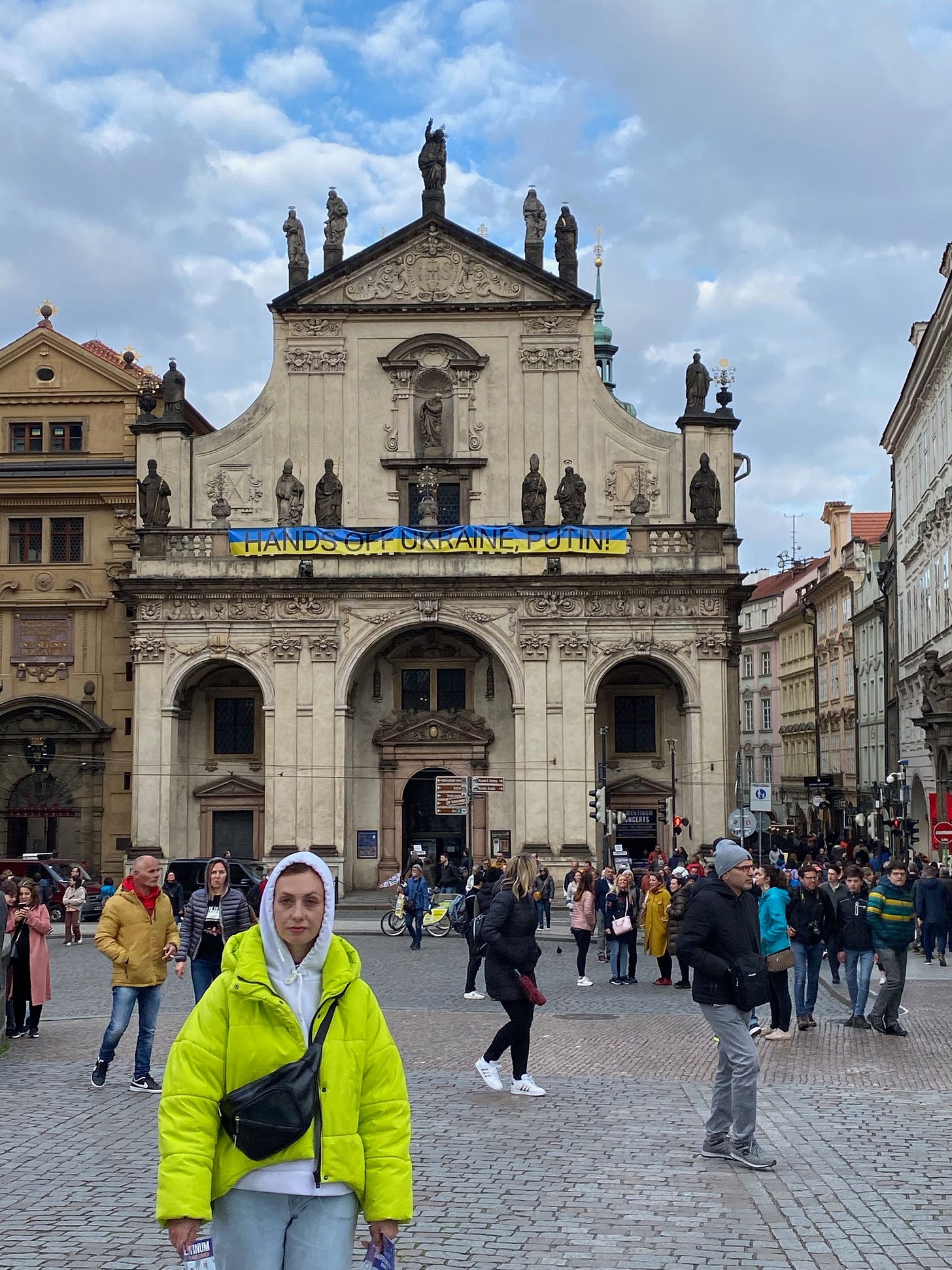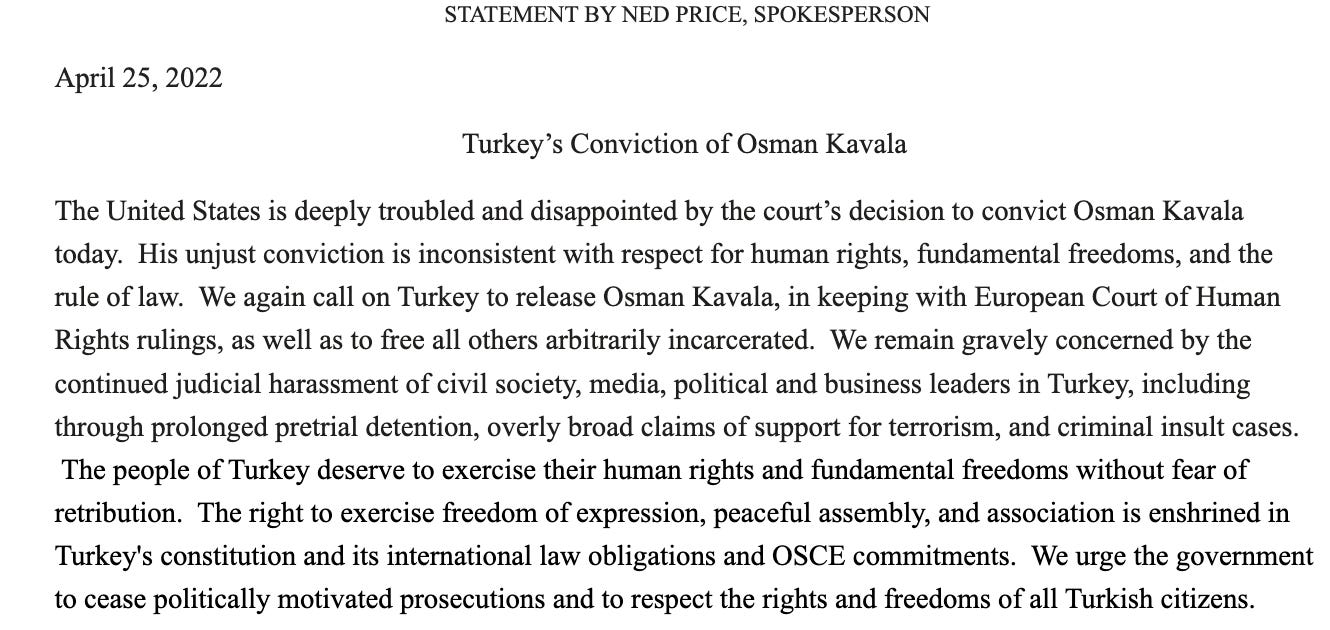Notes from five nights in Prague.
When I'm on holiday, I have time to do things I don't often get to do in everyday life: walk around a city for hours, breathe fresh air, feel sunlight on my face, and spend time away from my phone or other screens. It's almost like existing temporarily in another dimension. Sometimes I think if I'm not connected to my phone for at least 10 hours a day, I'll miss something crucial. But then I disconnect from the news for a week and find that, even after seven days away, I still have a pretty good grasp of what's going on. I didn't miss that much. It provides some perspective.
I arrived in Prague on Easter Sunday. The city was teeming with tourists. Germans, English, Spaniards, Italians. Prague felt like London before Brexit. I settled into a packed, dingy bar in the city center with a good friend who traveled from France to meet me, and I reveled in feeling connected to the world again. That international atmosphere felt like home. I like listening to accents and guessing people's origins, like a modern-day Henry Higgins, or asking strangers who they voted for after they've had too many drinks to lie.
But once most of the tourists left on Monday, the city felt markedly different. I noticed that many of the people I spoke to seemed frustrated and sad. People complained about inflation. The prices in Prague were comparable to the U.S. I regularly paid $3 or more for a cup of coffee. The average salary in Prague is around $1,200 a month. Rent for a 1-bedroom flat is about half of that. People are struggling. According to the Czech Statistical Office's data for April, beer is the only product in the supermarket that's not getting more expensive.
On the outskirts of the city where I stayed, about a 50-minute walk from all tourist destinations, I saw a lot of older men drunk on the streets. During a walk along the Vltava river, I passed semi-permanent homeless encampments where people built large bonfires under bridges to stay warm.
This was the first time I had been back to Prague in quite a few years, but the gap between the rich and poor seemed noticeably larger. I don't remember seeing so many luxury clothing shops before or so many people on the streets. Maybe they were there, and I didn't notice. But everyone I spoke to said things had gotten harder.
A friend from Prague runs a DIY social center with experimental music and theater performances. People filter in and out all day, volunteering to tend bar or set up sound systems. They're fermenting kimchi in a dark bathroom, and the smell of garlic is so overpowering I almost passed out when they opened the door. Behind the building, developers erected dozens of luxury condos, each with an identical garden plot. So far, the condos are lying empty.
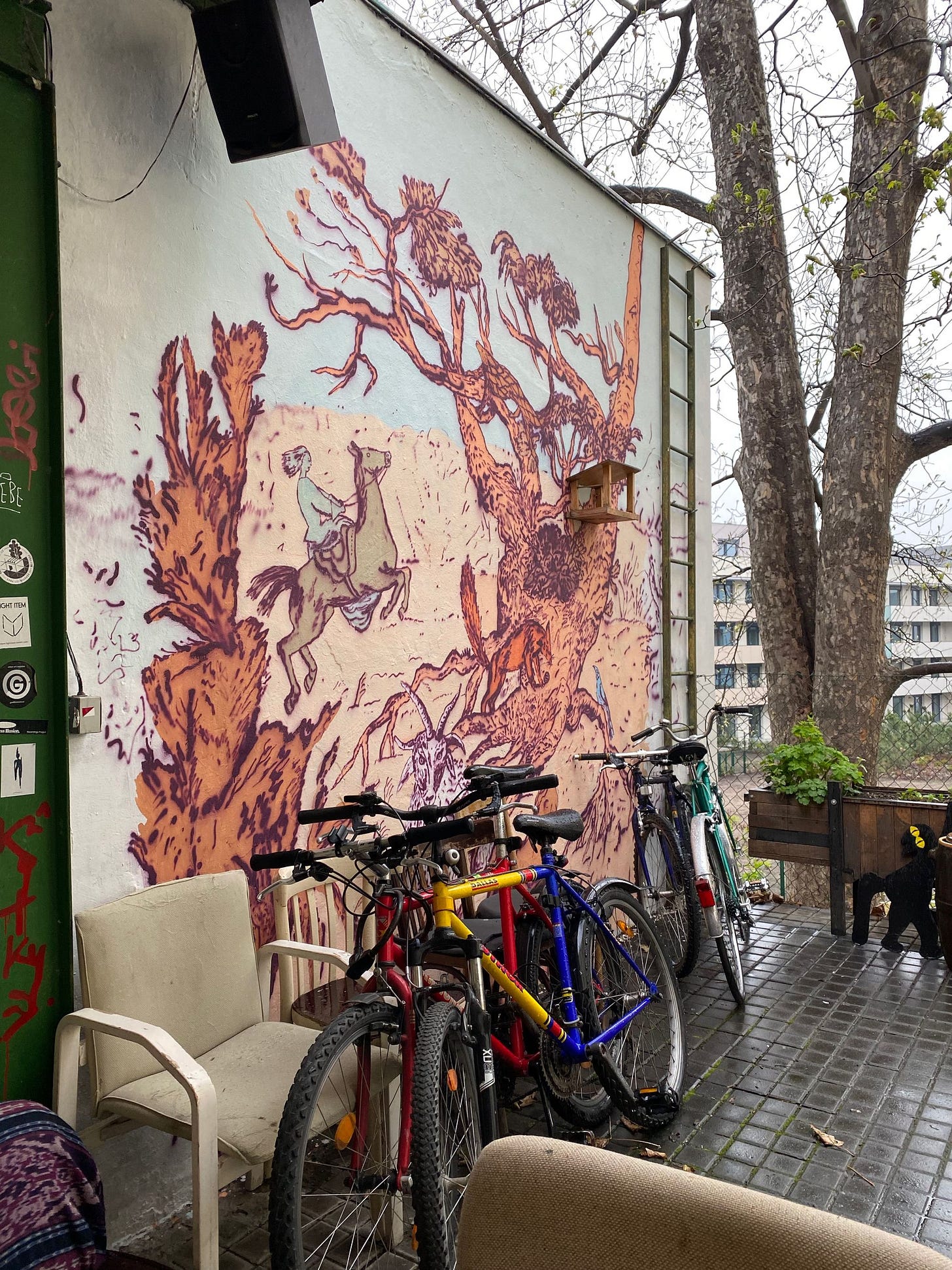
Covid, what Covid?
You would be forgiven for forgetting that there's a pandemic in Prague. The bars and restaurants are packed. So are the trams. Almost no one wears a mask. I'm honestly not sure how I didn't contract Covid-19 while I was there. Either the three doses of the Pfizer vaccine I received are doing their job, or I am one of the few super-immune people, or maybe Covid is a hoax (kidding!). Who knows?
If you need a PCR test to travel to the U.S., you can easily make an appointment here. They will email you a pdf with your test results, and you can pay more to get your results faster. It's a good thing they require a test before your flight because mask mandates are not a thing on planes in any country I transited through (Germany, Switzerland). I wasn't asked to put on a mask until I got on the New Jersey Transit heading home.
Ukrainians and Russians share the streets:
I heard a lot of Russian spoken around Prague. Groups of young Russians crowded into tram cars. Russian tourists posed for photographs in front of churches. Russians are the fourth largest foreign community in the Czech Republic. Thousands of Russians in Prague have openly protested the war in Ukraine, something they cannot do back home.
Meanwhile, like in the U.S., Ukrainian flags are everywhere. Several Czech people told me that Ukrainians were previously treated like second-class migrant workers. Now people treat them with deference. I caught up with a Ukrainian friend while I was there, a man who let me camp out on his bedroom floor in Kyiv when I first reported from Ukraine in 2014.
At the urging of his mother-in-law, who is from Crimea and has lived through a lot of this before, he and his wife and young daughter left the country days before the war began. They want to go home, but they're unsure if it will be possible to build a life there again. Even if the war ends soon, the country will be littered with landmines, and the economy will be decimated.
If you like this newsletter, share it on social media or upgrade to a premium subscription for $2 a month if you can afford it. It's less expensive than a cup of coffee in Prague!
Upgrade to a premium subscription by Clicking Here
What I'm writing:
• As Russia’s war against Ukraine enters a critical new phase, Congress is working to pass legislation that would streamline the Biden administration’s ability to provide crucial supplies to help Kyiv fight a protracted war. The lend-lease bill would waive specific provisions in the Arms Export Control Act and the 1961 Foreign Assistance Act related to the review and approval of foreign arms sales, significantly speeding up the transfer of military equipment to Ukraine [This article is unlocked].
• With Ukraine suffering devastating economic consequences from Russia's invasion, the U.S. government is looking for ways to raise much-needed funds for the war-torn country. The idea of selling Russian oligarchs’ assets and giving the proceeds to Ukraine is gaining traction in Congress and government agencies.
What I'm reading:
• The Azovstal steelworks plant in Mariupol continues to be pummeled by Russian airstrikes, even after Russian President Vladimir Putin declared victory in the city, Reuters reports.
• Occupation authorities in the Russian-held Kherson region of Ukraine said the area would adopt the rouble as currency, a sign that Moscow has no intention of returning the territory to Ukrainian control, the Financial Times reports.
• Russia proposed the forced donation of blood by captured Ukrainian soldiers, the Jerusalem Post reports, citing Ukrainian ombudsperson for Human Rights Lyudmila Denisova.
• Ukrainian officials said the Russian military hit a strategic bridge linking the southern Odesa region with neighboring Romania, the Associated Press reports.
• The U.S. has credible evidence Russia executed Ukrainians who tried to surrender in the Donetsk region, U.S. Ambassador-at-Large for Global Criminal Justice Beth Van Schaack said at the United Nations. The Hill has the report.
• U.S. Defense Secretary Lloyd Austin announced that the U.S. and its European allies had formed a “contact group” that will meet monthly to discuss the strategy for Ukraine to defeat Russia, NBC News reports.
• Bridget Brink, currently the U.S. ambassador to Slovakia, was nominated as U.S. ambassador to Ukraine, a position that has been vacant since early 2020, the Washington Post reports.
• Alina Kabaeva, the woman believed to be Russian President Vladimir Putin’s girlfriend, was spared sanctions in a last-minute decision. U.S. officials believe that sanctioning Kabaeva would be deemed so personal a blow to Putin that it could further escalate tensions between Russia and the U.S., the Wall Street Journal reports.
• Russia halted gas flows to Poland and Bulgaria and said it would keep supplies switched off until the two countries agree to pay for the fuel in rubles, Bloomberg News reports. The European Union accused Russia of “blackmail” after state-controlled gas company Gazprom shut off natural gas supplies to Poland and Bulgaria.
• Greenpeace and Extinction Rebellion activists tried to block a tanker from delivering Russian oil to Norway, chaining themselves to the vessel in protest against the war in Ukraine, Reuters reports.
• The State Department is offering a reward of up to $10 million for information on a group of Russian cybercriminals. Rewards for Justice is seeking information about six officers of the Main Intelligence Directorate of the General Staff of the Armed Forces of the Russian Federation (GRU).
• Explosions struck a building housing the security services of Moldova's breakaway republic Transnistria, days after Moscow said the Russian-backed region could be drawn into the war in Ukraine, the Financial Times reports. Moldova’s president immediately convened a meeting of the country’s security council, the Washington Post reports.
• Transnistria ordered a general mobilization of all adult males following reports of explosions, Balkan Insight reports.
• Moldova’s Deputy Interior Minister said the grenades used in the mysterious explosions in Transnistria are produced by Russia and are only used by the armies of Russia, Transnistria, and Gabon. “I don’t think these were the Gabonese,” he said, according to the Washington Post.
• Moldova's pro-Russian breakaway region of Transnistria said that shots were fired from Ukraine towards a village that houses an ammunition depot, Reuters reports.
• Emmanuel Macron won a second term as president of France, triumphing over his far-right challenger Marine Le Pen and avoiding the single-term trend of his predecessors, François Hollande and Nicolas Sarkozy, the New York Times reports.
• Slovenia’s populist right-wing Prime Minister Janez Janša suffered a heavy defeat in parliamentary elections, losing to a left-leaning party formed at the beginning of the year, Una Hajdari reports for Politico Europe.
• The Hungarian Foreign Minister Péter Szijjártó confirmed that Hungary would use a payment scheme put in place by Moscow to pay for oil and gas, CNN reports.
• Politico Europe reports on how Germany's Greens — a party born out of environmental, pacifist, and anti-nuclear movements — are pushing Chancellor Olaf Scholz to send more and heavier weapons to Ukraine.
• At least 17,000 people have been arrested in El Salvador amid a nationwide crackdown on gang violence, the Hill reports.
• A Turkish court convicted prominent Turkish philanthropist and activist Osman Kavala of trying to overthrow the government of President Recep Tayyip Erdogan, the New York Times reports. Emily Tamkin has some background on this case for the New Stateman's newsletter.
• Israel closed its civilian border crossing with the Gaza Strip, preventing thousands of Gazans from getting to work in Israel, the Wall Street Journal reports.
• Violent clashes broke out Friday between Palestinians and Israeli police at Al-Aqsa Mosque, in what has become a weekly occurrence ahead of midday prayers for the entire month of Ramadan, Haaretz reports.
• Israel fired artillery shells into southern Lebanon after militants launched a rocket into northern Israel, opening a new front in current Israeli-Palestinian tensions, the Wall Street Journal reports.
• The Chinese government is not only mistreating Uyghurs within China's borders. It is also hunting them down abroad with help from countries like Saudi Arabia, Egypt, and the United Arab Emirates, according to Bradley Jardine's new book from the Woodrow Wilson Center.
• A court sentenced Myanmar’s ousted civilian leader, Aung San Suu Kyi, to five years in prison after finding her guilty of corruption, the New York Times reports. Human Rights Watch says the accusations are false and the trial unfair.
• Islamic rebels in Mali linked to al-Qaida said they captured mercenary fighters from Russia’s Wagner Group, the Associated Press reports.
• Richard Olson, a former U.S. ambassador to Pakistan and the United Arab Emirates, was criminally charged for his alleged role in an undisclosed lobbying campaign for the Qatari government. Axios posted a copy of the criminal information.
What the State Department says:
If you like this newsletter, share it on social media or upgrade to a premium subscription for $2 a month if you can afford it. You can also write to me for any reason: c.maza@protonmail.com.
Upgrade to a premium subscription by Clicking Here






